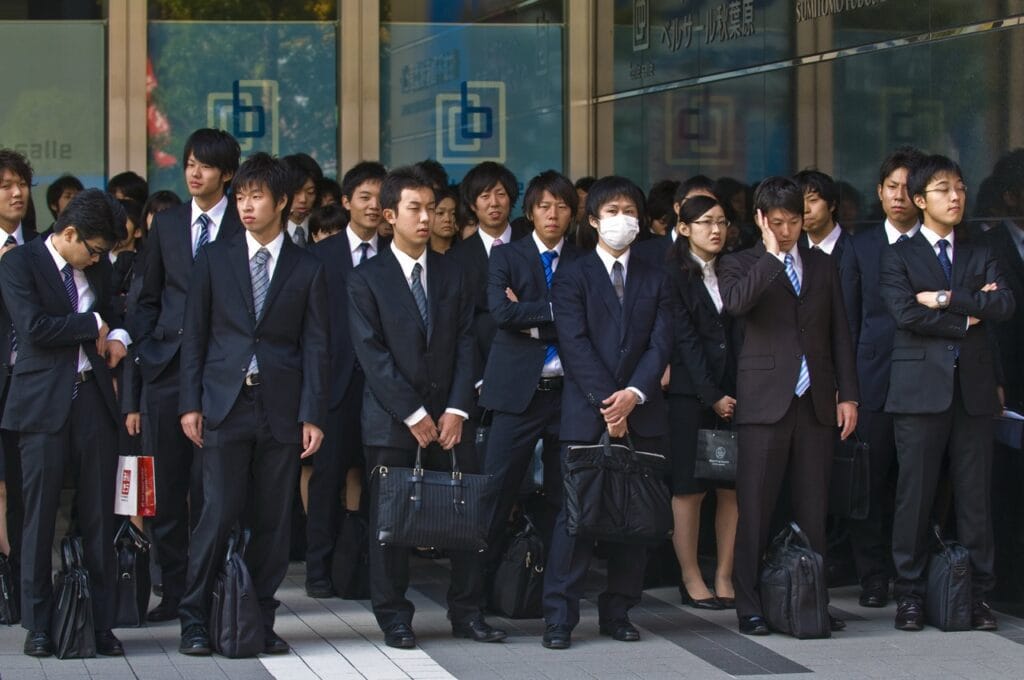Wondering what kinds of jobs you can land in Japan? Whether you’re a local resident or an expat looking to work abroad, Japan’s job market offers diverse opportunities that might surprise you!
From traditional corporate positions to modern tech roles, you’ll find the employment landscape is both rich in tradition and open to international talent.
Let’s explore the most common career paths that could be your ticket to working in the Land of the Rising Sun. 🗾
Job Market Overview in Japan

Japan’s growing economy offers exciting opportunities across tech, manufacturing, and service industries, with companies actively seeking both local and international talent.
You’ll find that the structured job market reflects Japanese work culture, which values dedication, teamwork, and attention to detail in every role.
Whether you’re interested in cutting-edge IT positions or traditional manufacturing jobs, Japan’s current talent shortage means there’s room for skilled professionals who can adapt to the unique workplace expectations!
Key Industries and Employment Trends
While experiencing notable economic growth and digital transformation, the modern Japanese job market presents exciting opportunities across multiple industries!
You’ll find the tech sector is booming – companies need experts in AI, cloud computing, and cybersecurity.
The financial services industry is also hot, especially for risk management roles.
If you’re interested in tourism, there’s growing demand as Japan welcomes more international visitors.
What’s really exciting is that many companies now offer remote work options!
Plus, if you’re tech-savvy, you’ll be thrilled to know that firms are actively pursuing international talent with competitive packages.
The digital transformation wave means plenty of opportunities for both locals and expats! 🚀
Work Culture and Expectations
Understanding the work culture can make all the difference in your Japanese career journey!
You’ll notice that Japanese workplaces highly value group harmony and attention to detail. It’s quite different from what you might be used to!
When working in Japan, you’ll typically experience:
- Lots of group meetings and consensus-building before decisions
- A strong emphasis on respecting hierarchies and senior colleagues
- Regular after-work social gatherings with your team
Job Availability for Locals vs. Expats
Looking for work in Japan presents different opportunities depending on whether you’re a local or an expat!
For locals, the job market‘s quite promising, with a low 2.7% unemployment rate and plenty of openings in sales, manufacturing, and tech sectors.
You’ll find 127 job openings for every 100 job seekers – pretty good odds!
For expats, while Japanese language skills can boost your chances, you don’t always need them.
Teaching English remains a popular choice, but there are growing opportunities in:
- Tech and research roles
- Tourism and hospitality
- International sales
- Specialized technical positions
The average salary is about ¥6.2 million yearly, regardless of nationality.
Most Common Jobs for Locals
Looking at Japan’s workforce, you’ll notice some clear patterns in the most common jobs that locals hold.
The iconic “salaryman” and “office lady” (OL) roles remain prevalent in corporate settings, while manufacturing, retail, construction, and healthcare employ huge numbers of Japanese workers across the country.
Whether in bustling city offices or local manufacturing plants, these core industries form the backbone of Japan’s working world!
Office Workers (Salarymen & OL)

Office workers in Japan, known as “salarymen” and “OL” (Office Ladies), form the backbone of the country’s corporate world.
You’ll find these dedicated professionals putting in long hours, often working around 45 hours per week, in roles ranging from sales to administration.
If you’re curious about what defines office life in Japan, here are three key aspects:
- Monthly salaries typically range from ¥130,000 to ¥2,300,000
- The average commute takes about 1 hour each way
- Workers only take about 9 days of paid leave yearly!
While the work can be demanding, office jobs remain stable and respected positions in Japanese society.
Manufacturing and Factory Jobs
While Japan’s corporate offices bustle with activity, the manufacturing sector stands as the nation’s biggest employer, providing jobs to over 10 million people!
If you’re interested in manufacturing work, you’ll find plenty of opportunities in electronics, automotive, and other industries. The average monthly salary is quite attractive at 890,413 yen.
Common roles include:
- Assembly line work
- Quality control inspection
- Machinery maintenance
- Production management
You’ll need solid technical skills and attention to detail.
While factory work can be physically demanding, most companies offer great training and competitive benefits.
Plus, with Japan’s push toward automation, you’ll get to work with cutting-edge technology!
Retail and Customer Service Jobs
Despite Japan’s reputation for high-tech industries, retail and customer service jobs remain the backbone of local employment!
You’ll find plenty of opportunities in stores, supermarkets, and hotels across the country.
Want to picture yourself in retail? Here’s what you can expect:
- Working at busy convenience stores, helping customers 24/7
- Assisting shoppers at department stores with purchases and inquiries
- Managing inventory and stocking shelves at supermarkets
These jobs are perfect if you enjoy working with people!
While most positions require conversational Japanese, many employers now welcome foreign workers – especially in tourism-heavy areas.
Plus, you’ll find both part-time and full-time options to suit your needs.

Construction and Skilled Trades
Moving from customer service to the construction industry, Japan’s skilled trades sector offers some of the country’s most stable and rewarding career paths!
If you’re physically fit and don’t mind manual labor, you’ll find plenty of opportunities in major cities like Tokyo and Osaka.
As a construction worker, carpenter, plumber, or electrician, you can expect to earn between ¥2-4.5 million yearly.
The keys to success? You’ll need:
- Strong physical stamina
- Basic Japanese language skills
- Understanding of safety protocols
- Ability to work in teams
Construction work is especially active in urban development and disaster recovery projects! 🏗️
Healthcare and Nursing

As Japan’s population continues to age, healthcare and nursing have become some of the most in-demand career paths in the country!
If you’re interested in nursing, you’ll find plenty of opportunities, with over 1.1 million nurses currently working across Japan.
The nursing field offers:
- Competitive salaries around 4 million yen annually
- Various specializations from emergency care to surgical units
- Growing demand with an expected shortage of up to 130,000 nurses by 2025
While the work can be challenging, the government’s actively improving conditions through better work-life balance policies and career advancement opportunities.
Plus, you’ll be making a real difference in people’s lives! 🏥
Most Common Jobs for Expats
The Japanese job market offers exciting opportunities for expats looking to work abroad, with English teaching positions being the most accessible entry point.
If you’re tech-savvy, you’ll find plenty of IT and engineering roles available, while those with strong language skills can explore translation and interpretation work.
Whether you’re interested in joining Japan’s booming tourism industry or helping other foreigners find work through recruitment consulting, you’ll discover that many companies are enthusiastic to hire international talent!
English Teaching Jobs
For many expats seeking adventure in Japan, English teaching provides an exciting gateway into Japanese life and culture!
You’ll find plenty of opportunities with salaries ranging from ¥230,000 to ¥600,000 monthly, helping you maintain a comfortable lifestyle.
Picture yourself:
- Leading fun classroom activities as an ALT in public schools
- Teaching motivated adults at private language schools (eikaiwas)
- Tutoring students one-on-one in cafes around Tokyo
The best part? You don’t need to be fluent in Japanese!
With just a bachelor’s degree and clean background check, you can start your teaching journey.
Most positions even include visa sponsorship and housing assistance.
IT and Engineering Jobs
While English teaching remains popular, Japan’s booming tech industry offers some of the most lucrative opportunities for skilled expats!
You’ll find plenty of IT and engineering jobs in major cities like Tokyo and Osaka, with annual salaries averaging ¥4.5 million.
The best part? Many roles don’t require Japanese language skills, especially if you’re working with international teams.
Hot areas include software development, AI, data science, and cybersecurity.
If you’ve got specialized skills in these fields, you could earn over ¥5 million yearly!
Plus, most companies offer attractive bonus structures and growth opportunities.
Ready to immerse yourself in Japan’s tech scene? Your expertise is in high demand! 🚀
Translation and Interpretation
Beyond tech opportunities, Japan offers another exciting career path that puts your language skills to work! Translation and interpretation jobs span diverse industries, from gaming to medical fields.
Want to picture yourself in this role? Here’s what you’ll do:
- Transform Japanese documents into clear English content
- Help localize video games and anime for global audiences
- Interpret during business meetings and conferences
You don’t always need Japanese skills, as many companies need English-to-other-language translations. The pay is attractive too – experienced translators can earn up to 704,000 yen monthly!
Plus, with growing remote work options, you can often work flexibly from anywhere. 🌍✨

Hospitality and Tourism Jobs
As Japan’s tourism industry continues to boom, hospitality jobs have become a golden opportunity for expats looking to work abroad!
You’ll find exciting roles in hotels, travel agencies, and tourism companies. Many positions value both English and Japanese language skills, making you extra valuable if you’re bilingual!
While Japanese proficiency is often required, your English abilities can help you land jobs working with international guests.
Keep in mind that you’ll need to adapt to Japanese service culture, but don’t worry – many hotels are now using digital systems that make work easier.
Plus, major chains like Marriott are actively hiring foreigners!
Recruitment and HR Consulting
The recruitment and HR consulting industry represents another exciting path for expats in Japan! If you’re a people person with strong English skills, you’ll find plenty of opportunities to build an exciting career.
Your typical day might include:
- Interviewing candidates and matching them with great companies
- Supporting international clients with their HR strategy needs
- Building relationships across diverse cultural backgrounds
You’ll need solid communication skills and business-level Japanese to succeed.
The good news? Many firms offer competitive packages with bonuses for successful placements!
Plus, you’ll work in dynamic, multicultural environments where you can grow professionally while helping others advance their careers.
How to Find a Job in Japan
Finding a job in Japan doesn’t have to be overwhelming when you know where to look!
You’ll want to start with popular job sites like GaijinPot and Daijob, while also connecting with recruitment agencies that specialize in placing international workers.
Whether you’re teaching English or pursuing an IT career, you’ll need to secure the right work visa and understand Japanese business etiquette to make a great impression on potential employers.

Best Job Search Websites and Agencies
Modern job hunting in Japan has become increasingly digital, with numerous websites and agencies ready to help you land your dream position.
Popular platforms like Indeed and Doda offer extensive listings, while GaijinPot specializes in opportunities for foreigners.
Your top 3 go-to job search resources should be:
- Indeed – Japan’s most visited employment website 🔍
- GaijinPot – Perfect for English-speaking job seekers ✨
- Daijob – Excellent for bilingual positions 💼
Don’t forget about specialized agencies! Companies like BizReach and Career Cross can connect you directly with employers, especially if you’re targeting foreign-owned companies or global opportunities.
Many sites offer both English and Japanese interfaces, making your search much easier!
Networking Strategies and Cultural Etiquette
While job search websites can help you discover opportunities, successful job hunting in Japan relies heavily on building meaningful connections.
You’ll need to master both modern networking tools and traditional Japanese business etiquette.
| Networking Method | Best For | Tips |
|---|---|---|
| Industry Events | Meeting professionals | Bring business cards! |
| Online Platforms | Building presence | Keep LinkedIn updated |
| Language Exchange | Improving skills | Join weekly meetups |
| After-work Drinks | Building relationships | Accept invitations |
Remember to respect hierarchies and group harmony when networking.
Attend events during peak hiring seasons (spring and late summer), and don’t forget to join expat communities like InterNations or Work Japan for extra support!
Work Visa Types and Application Process
Before you can start working in Japan, you’ll need to secure the right type of work visa for your situation.
The most common options include the standard Work Visa for professionals, Specified Skills Visas (SSV1 and SSV2), and the Highly Skilled Professional Visa.
The application process typically follows these steps:
- Find an employer who’ll sponsor your visa
- Obtain a Certificate of Eligibility (CoE)
- Submit your application with required documents like your passport and resume
Frequently Asked Questions
What Is the Average Retirement Age for Workers in Japan?
You’ll find Japan’s mandatory retirement age is typically 60, though it’s increasing to 65 by 2025. However, many Japanese workers continue working beyond these ages, with high participation rates into their late 60s.
Do Japanese Companies Offer Paternity Leave Benefits?
Time’s ripe for change! You’ll find Japanese companies must offer paternity leave by law, allowing you up to 8 weeks after birth and extended leave until your child’s first birthday, with paid benefits included.
How Long Does the Typical Job Interview Process Take in Japan?
You’ll typically face a 2-4 month interview process in Japan. It’ll include multiple rounds (2-4 interviews) with different company representatives, starting with HR and progressing through department managers and executives.
Are Tattoos Acceptable in Japanese Workplaces?
You’ll find tattoos are generally not accepted in Japanese workplaces. You’ll need to cover them up, as they’re still stigmatized. While attitudes are slowly changing, most companies maintain strict policies against visible tattoos.
What Are the Standard Working Hours per Week in Japanese Companies?
You’ll typically work 40 hours per week in Japanese companies, with 8-hour workdays. However, you might face overtime beyond these standard hours, though it’s legally capped at 45 additional hours per month.




